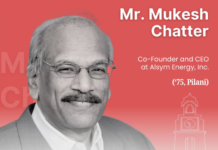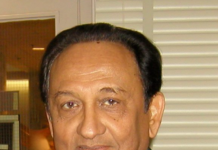By Upendra Mishra
BOSTON – Finally, after three intense months of proving myself, I received news I’d dreamed of: I was going to be a foreign correspondent for one of the world’s largest news agencies. The reality felt like a mirage—one moment, I was in a small newsroom for a local newspaper in Mexico City; the next, I was heading into a world of political intrigue and armed conflict, armed with nothing but a notepad and an unrelenting curiosity.

UPI: A Mini United Nations of Journalism
At UPI, the staff split into English and Spanish desks, each operating like twin gears in a finely tuned machine. The Spanish desk churned out daily dispatches across Latin America, translating English stories and maintaining strong ties with UPI’s ubiquitous Latin bureaus.
Meanwhile, the English desk chronicled the same region for a global, anglophone audience—including stories from Mexico, Guatemala, El Salvador, Honduras, Nicaragua, Costa Rica, Panama, Puerto Rico, and the rest of the Caribbean.
The 1980s were the epicenter of change. Guatemala, El Salvador, and Nicaragua roiled with insurgencies—each conflict draped in Cold War narrative and ideological fervor. Everywhere I looked, revolution and repression converged.
Our coverage didn’t ripple—it thundered. Add the specter of Latin American debt crises and UPI instantly became “dreamland” for a young, driven reporter like me.
I was young, single, and newly obsessed with international reporting. Nothing was more important than UPI. I became that journalist who would pack my bag at 3 a.m. for a story. Whenever, wherever—my phone never slept.
Firing on All Cylinders
My dedication made waves in Washington. The foreign desk editors recognized my hustle, and before long, I was the go-to reporter whenever a crisis sparked in the region.
Once, I invited a woman friend over for dinner—someone I was quietly growing close to. She wasn’t just a casual friend; there was a warmth in her presence, a softness in her laughter that lingered with me long after she’d leave. That evening, I had prepared an elaborate Indian food, filling the kitchen with the scent of ginger, garlic, and cardamom. It was my way of offering a piece of home, of trying to say what I didn’t yet have the courage to speak aloud.
She arrived with a bottle of wine and a smile that could have calmed the chaos of Mexico City. I remember the way her eyes lit up when she saw the table set, how she laughed when I awkwardly tried to explain the difference between garam masala and curry powder. We were just about to sit down, two plates steaming with effort and intent, when the phone rang.
It was around 10:00 p.m.
A fire. No—a massive explosion in the firecracker market in Mexico City. Screaming vendors. Chaos. My editor’s voice on the other end of the line in Washington, DC was clipped, cold, and unmistakable: “Go. Now.”
I looked at her. Just for a second. She said nothing, but I saw her eyes fall to the table. The wine unopened. The food still warm.
“I’m sorry,” I muttered, already grabbing my bag and notebook. “I have to—”
I didn’t finish. I couldn’t. I was already out the door.
I raced through the city’s darkened streets, the sirens wailing like broken promises. When I arrived at the market, the sky was red with fire and ash, people running, shouting, sobbing. I did what I always did—I gathered, observed, asked questions, took notes. I became the story’s lens, not its heart.
Hours later, I filed the piece—tight, factual, urgent. One of the best I’d written. The editor praised it. The wire picked it up everywhere. And yet, when I returned home, the curry was cold, the wine untouched, and she was gone.
I thought she would never came back, but she eventually became my best buddy in Mexico.
I often think of her. Of that night. Of what I sacrificed in the name of “the story.” At the time, it felt noble—important. But now, decades later, I wonder: what did I really gain? I wrote a story that disappeared in a day’s news cycle. But I lost something—that time– I’ll never get back. Her silence taught me what the deadline never could—that every reporter leaves behind not just places and people, but versions of themselves they never fully understood until it was too late.
Another night, I slept over at a friend’s house—with one ear tuned to the phone. Rumors swirled that U.S. forces were about to invade Panama to oust General Noriega. In the dead of night, the call came: “You must coordinate coverage from the Mexico City office.” I sprang up and headed straight to the bureau.
The Mexico City Bureau: Where the World Converged
Our Mexico City office felt like a miniature UN. Latin American reporters, siblings from Chile, Argentina, Peru, Mexico—intermingled with English-speaking colleagues from the U.S. and Canada. Bureaus in Central America and the Caribbean were constantly pinging us. If something happened anywhere near these borders, we were on it.
The advantages were immediate: access. I was speaking to embassy officials, presidents’ offices, and business titans. I was at airports, political rallies, car-rental lots—everywhere an editorial opportunity awaited. Single, unencumbered, and culturally curious, I lived fast—and yes, I partied harder.
Mexico City’s nights were endless. Florescent lights, tequila, mariachi, rhythms that trembled in your bones. I didn’t dance much—unless the tequila kicked in and someone forced my feet into motion—but I did host parties at my apartment. Good food, lively conversation, laughter spilling into early morning hours. Life felt rich.
Rising Through the Ranks
My fieldwork paid off. Gradually, assignments turned larger in scope, and I moved up fast. I became editor for Mexico, Central America and the Caribbean on the English wire—overseeing every story coming out of the region. The Spanish desk ran itself, so I focused on curation and dissemination, and then it happened: the bureau chief left. By default and mutual acknowledgment, I became the UPI Bureau Chief. At barely thirty, I was probably one of the youngest regional heads in UPI’s global network.
I remember our Australian vice president calling me “kiddo,” with both affection and surprise. As I settled into the post, ideas of domestic comfort began to surface.
Crossroads: Love, Duty, and Family Honor
As my career soared—stories filed, bylines multiplying, doors opening—I began to feel an emptiness I couldn’t file away or edit out. A different longing surfaced: the desire to settle down, to find someone to share the quiet moments that never made the headlines. I began thinking seriously about marriage. But inside me were two battles—one cultural, the other deeply personal.
The first was a lifelong imprint, etched in bold by my family and reinforced by years of tradition: never marry a foreigner. Not just advised—commanded. An unshakable rule that had fused itself to my bones. Despite being educated, progressive, and believing deeply in love, equality, and modern ideals, I couldn’t shake it. It held me hostage in ways I didn’t fully grasp at the time.
The second battle was harder to admit.
In Mexico, I dated. I spent time with women who were brilliant, warm, funny, beautiful—each relationship effortless on the surface. Some even felt like they could become something real. But deep down, I already knew I would never marry any of them. I had already written the ending before the story began.
Looking back now, with the benefit of time and bruised humility, I see it clearly: I was a coward. Worse, I had become the kind of man I once despised—the ones who string women along, who take without giving back fully, who let societal expectations drown personal truth. I became a quiet kind of betrayer—not with lies or deceit, but with my silence, my inability to choose heart over heritage.
I hurt people. Good people. Women who deserved better than a man too weak to love them honestly.
I now know that cultural conditioning, no matter how deeply embedded, is not an excuse—it’s a challenge to overcome. And I failed.
For a long time, the guilt sat inside me like unfinished copy—nagging, uncomfortable, unresolved. But the moment I stopped justifying it, the moment I called myself out—truly and without defensiveness—that’s when something shifted. Owning that failure didn’t erase it, but it began to dull its edges. It made me human again.
To those women—whose smiles I remember, whose trust I didn’t deserve—I owe more than regret. I owe an apology I never gave. I was too focused on my deadlines, my rising career, my imagined duty to a distant idea of pride. And in doing so, I dismissed what was real, present, and precious.
If I could go back, I would say: I’m sorry. You were not a stepping stone on my way to self-importance. You were a mirror I was too afraid to look into. Today, I carry that guilt not as a punishment, but as a reminder—to never again let fear speak louder than truth, or pride speak louder than love.
That reckoning—of who I had become and how I had failed—opened up another, deeper wound. One I had long tried to bury under the noise of deadlines and datelines. Because there was someone I had once loved, truly and fully. A brilliant, passionate JNU girl who had captivated my heart when I was too young to know what to do with it.
She wasn’t just smart—she was electric. Fierce, gentle in presence, wrapped in that unforgettable Rajasthani pink kurta and jeans. Our connection had been real. Simple. Honest. And maybe that’s why I let it slip away. I didn’t fight hard enough. Life pulled us in different directions, and I—forever in pursuit of achievement—didn’t return in time. By the time I looked up, she was married. Gone. A chapter I’d never get to finish.
That loss haunted me more quietly than the others. There were no dramatic goodbyes, no closed doors—just time and silence, and a regret that matured slowly, painfully. She had moved on, and I respected that. But in doing so, something in me began to close. I started to believe that maybe I didn’t deserve a love like that anymore.
So the decision felt inevitable: go to India and marry someone suitable. The dutiful son. The good Indian boy. It was the path of least resistance—but not of least pain.
Even as I booked the ticket, part of me whispered: Is this how your story is supposed to go?
I silenced the voice. I told myself I was doing the right thing—protecting my family’s honor, respecting the culture that raised me. But deep inside, I knew. It wasn’t a choice born of love—it was born of fear.
Today, I look back and call it what it was: a stupid idea. Not because of the woman I would eventually marry—who brought her own light and strength—but because of the way I let the past shape my present. Because of the way I let silence and duty override heart and honesty.
And yet—there’s a strange kind of healing in telling the truth, even years later. In naming the losses and the failures. In admitting you weren’t the hero of your own love story.
That acceptance became the turning point. Not a dramatic transformation, but a quiet surrender. The guilt remained—but now, it was matched by courage. The courage to move forward. To begin again. To carry the weight with integrity.
A Reluctant New Chapter
A call to Kamlesh Misra, a dear friend and PhD candidate at Northeastern in Boston, offered me an alternative. After opening with a teasing jab—“So, you’re happily married, kids, settled in Mexico?”—he suggested I visit. “I know three girls in Boston. Come meet them.” “I’ll meet only one,” I decided. I didn’t want rejections—or to be rejected. That would be unfair.
Two weeks later, I found myself landing in Boston on a Friday evening—ready to meet “the one.”
Stay tuned for Chapter 22: Meeting the Girl in Boston.
(Upendra Mishra is the author of After the Fall: How Owen Lost Everything and Found What Really Matters, and the managing partner of The Mishra Group. He writes passionately about marketing, scriptures, and gardening. Learn more at www.UpendraMishra.com.)














